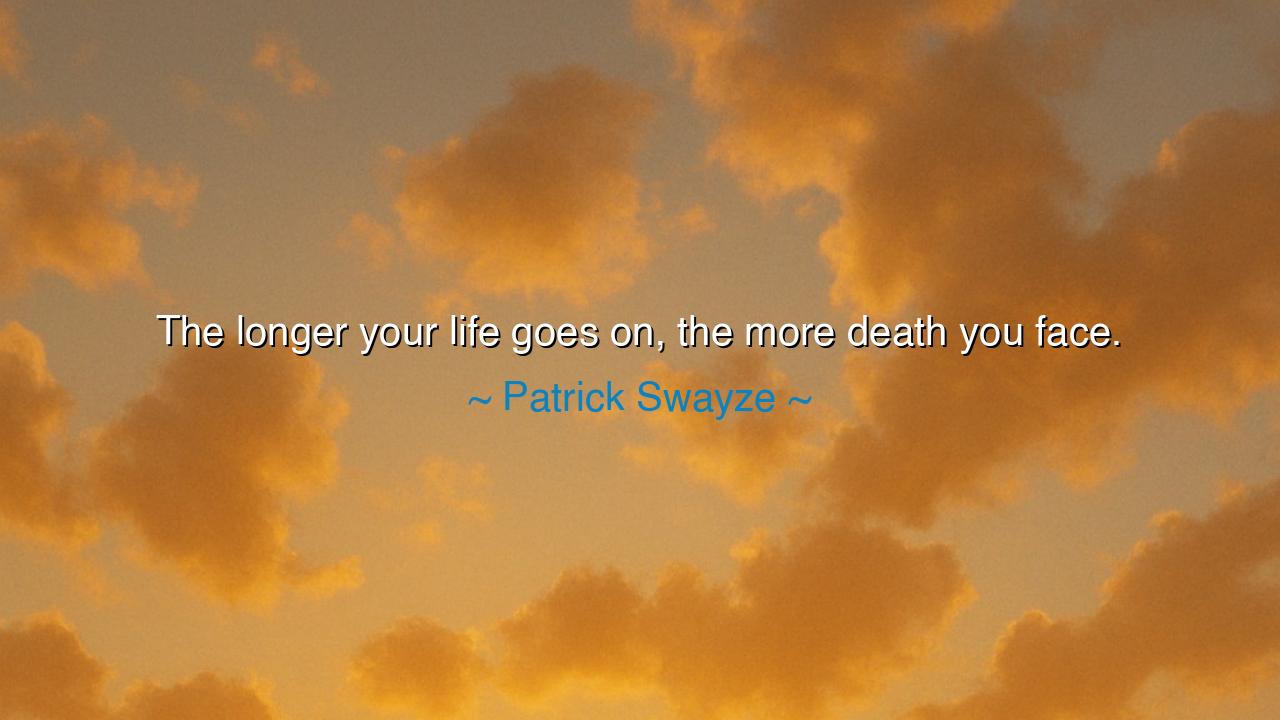
The longer your life goes on, the more death you face.






In the words of Patrick Swayze, a man who lived with grace, fought with courage, and faced death with open eyes, there echoes a truth carved from the stone of human experience: “The longer your life goes on, the more death you face.” These words are not spoken in bitterness, but in understanding — for Swayze himself walked the long road between life and death, feeling both the fire of vitality and the shadow of impermanence. His wisdom is not that of the philosopher’s study, but of the warrior’s journey — the kind born of love, loss, and the fleeting beauty of existence.
As the years unfold, each dawn brings not only new beginnings, but also farewells. The faces we once knew fade into memory; the voices that once filled our days fall silent. This is the inevitable rhythm of life: as we live longer, we must also learn to live with absence. Death, in this sense, is not only the end of our own being, but the gradual departure of those who built the world around us — friends, mentors, lovers, parents. To endure this is not weakness; it is to become acquainted with the deep waters of the soul, where love and sorrow flow as one.
There is no malice in this truth; only a call to awaken. For when Swayze speaks of facing death, he does not mean surrendering to despair, but learning to walk beside it with humility. To face death is to understand life more deeply. It strips away illusion and vanity, revealing what is real — compassion, forgiveness, tenderness. Those who have buried their beloveds, who have seen the seasons take away what they hold dear, often walk with quieter steps and kinder eyes. They know that every heartbeat is a gift, every sunrise a mercy, every embrace a small victory over time.
Consider the story of Swayze himself, who, when stricken with cancer, refused to retreat into self-pity. He continued to work, to love, to live with dignity. In interviews, he spoke not of fear, but of acceptance — of learning to treasure the simple things: his wife’s laughter, a horse’s gallop, the taste of rain on the wind. He knew what many forget — that to live fully is not to avoid death, but to live in spite of it. In his struggle, he became an emblem of courage, a reminder that mortality does not diminish us; it defines us.
This lesson is as old as the mountains. The Stoics of ancient Rome, too, taught that death is not the enemy but the mirror of life. “Memento mori,” they said — remember that you must die. But in remembering, they did not fall into sorrow; they rose into gratitude. Each act of kindness became more precious, each moment of joy more sacred. They understood that when we face death often — not only in our own lives, but in the passing of others — we begin to see the world as it truly is: fragile, transient, and infinitely valuable.
And so, the longer we live, the more we are invited to become guardians of memory. Each death we witness leaves a mark upon our spirit — not as a wound, but as a seal of wisdom. Those who have faced many losses carry the stories of the departed within them. They become living vessels of remembrance, keeping the flame alive for those who can no longer hold it. To endure such a burden is to love deeply, to continue walking even when one’s heart has been shattered and remade a hundred times over.
Therefore, let us not dread the truth of Swayze’s words, but honor them. If the price of long life is to face much death, then let that price be paid in love, not in fear. Let every passing remind us to live more kindly, to speak more gently, to cherish more fiercely. For though death may meet us again and again, it cannot conquer the spirit that chooses to love in spite of loss. That is the eternal victory of humankind — to face the darkness, yet still choose the light.
Thus, remember this teaching: the more death you face, the more alive you must become. Let every sorrow refine your heart, every farewell strengthen your gratitude, and every memory awaken your compassion. In this way, when your own final hour comes, you will not tremble before it. You will meet it as Patrick Swayze did — not as a stranger, but as an old companion, knowing that life was never measured by its length, but by the love and courage with which it was lived.






AAdministratorAdministrator
Welcome, honored guests. Please leave a comment, we will respond soon